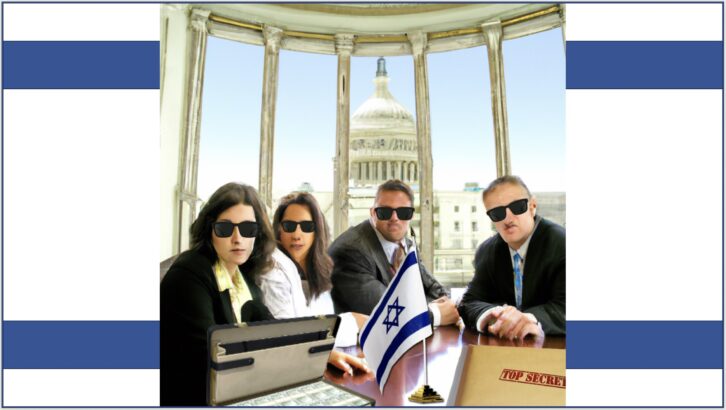Grant F. Smith discusses AIPAC, the American-Israel Public Affairs Committee, which he describes as “a combination of lobbying, espionage, and covert activities”
reposted from IRMEP, the Institute for Research Middle Eastern Policy, March 26, 2024
(transcript from the March 22, 2024 KKFI program Understanding Israel Palestine Audio (MP3)
Margot Patterson: My guest today is Grant F. Smith, the founder and director of the Institute for Research Middle Eastern Policy, a non-profit that does public interest research. Since it was founded in 2002, the Institute has filed dozens of requests for documents under the Freedom of Information Act and multiple lawsuits seeking to elicit information about Israel’s actions in the United States and or demand accountability for actions that violate U.S. laws.
Smith is the author of a number of books, including How Israel Made AIPAC, Spy Trade, Foreign Agents, the American Israel Public Affairs Committee from the 1963 Fulbright Hearings to the 2005 Espionage Scandal and Big Israel: How Israel’s Lobby Moves America. Grant Smith, welcome to Understanding Israel-Palestine.
Grant Smith: Thank you very much for having me on.
Margot Patterson: You have devoted 20 years to examining how Israel and its supporters in the United States shape U.S. policy and politics. I want to ask you about your research and conclusions. But first, what got you started examining this subject, which for years was considered off limits as a topic too explosive to publicly discuss because of fears that allusions to the Israel lobby could or would be considered anti-Semitic?
Grant Smith: One of the things that really intrigued me was the very overt and admitted role of neoconservative thinkers working for Benjamin Netanyahu, who then pivoted into the George W. Bush administration and essentially started implementing the “Clean Break Plan.”
I had been involved in researching public policy and the impact of lobbies earlier in my life. And so I found that, taboo or not, nobody was doing as much as was needed to ferret out the foreign influence role in U.S. regional policy.
Margot Patterson: One of your books is called Big Israel, How Israel’s Lobby Moves America.
Let’s start there. How does the lobby move the United States and where does the American Israel Public Affairs Committee, commonly referred to by its acronym, AIPAC, fit in terms of the Israel lobby? That loose coalition runs a wide gamut from far-right organizations such as the Zionist Organization of America to legacy organizations such as the Anti-Defamation League and the American Jewish Committee to Christian Zionists to liberal Zionist groups like J Street or Americans for Peace Now. What’s AIPAC’s role and what makes it of particular interest to you, the subject of many of your books?
Grant Smith: I would say that the most important thing about the lobby as regards to influence and organization is that many of those organizations you just mentioned form part of what I call a “legitimator network” of organizations that make up this broad coalition that advances policies that benefit Israel’s government.
The American Israel Public Affairs Committee channels all of that influence and offers executive memberships to all of those organizations in its committees to then channel all of that into lobbying the Congress and the president. The book Big Israel broke down how the organizations worked across the United States with Jewish federations and committees for public affairs at every major population center that then seamlessly network into organizing candidate speaking opportunities and chances to meet with donors of those organizations, all the way up to sending members to the AIPAC annual conference in Washington D.C. to then lobby members of Congress to enact policies favorable to Israel’s government. There are actual maps and all sorts of charts in that book Big Israel to help understand how the lobby moves America.
The term comes from Benjamin Netanyahu who once said that America is “very easily moved” and it’s very easily moved because of this national organization. Our recent work is really focused on the American Israel Public Affairs Committee, which is the tip of the spear.
The four things to really understand about AIPAC that almost nobody knows or acknowledges are that number one, it was set up with 60 million dollars of foreign, mostly Israeli funds laundered into the U.S. in the 50s and 60s, and anyone who disbelieves that can consult pages of the Senate record where the amount each year is actually noted and acknowledged to be foreign funding.
Number two, AIPAC’s objective ever since it appeared on the scene is to make the U.S. serve the needs of the Israeli government, especially arms and funding, but also backing positions that harm the United States and the rest of the world, and we can certainly talk about a couple of those right now.
The U.S., number three, tried to regulate AIPAC as a foreign agent of Israel under the Foreign Agents Registration Act but failed. The behind the scenes battle between the Justice Department and AIPAC was kept secret until 2008.
That rarely is mentioned by establishment media and most of those holding themselves out to be experts or critics of the lobby.
Number four, the lobby in the form of AIPAC is clearly not American as apple pie because it really was set up from the beginning to serve a foreign government with Americans who worked in that foreign government, and it engages in tactics up to and including espionage operations with Israel against the United States, and there are many examples of that.
However, like the drive to register AIPAC as a foreign agent, it’s just simply too powerful to actually face any accountability for its actions, illegal or not.
Margot Patterson: You just mentioned that AIPAC was asked to register as a foreign agent and did not, and you refer to this battle between AIPAC and the Justice Department that mainstream media rarely refers to. Why doesn’t it? Is it because most mainstream media isn’t aware of this battle that went on, or is it just that it seems impolitic to talk about it?
Grant Smith: They would face immediate consequences from the lobby’s attack dog, the Anti-Defamation League, if they raised that history, no matter how well documented. So most of them shy away from it.
They simply follow the AIPAC line, that it came out of this milieu back in the 50s and 60s of boutique special interest groups, very vague language. So even the New York Times tried to write a piece about AIPAC’s conference on Monday, and it just won’t go into AIPAC’s history. I think it’s fear, yet to constantly have such a powerful influence in the United States and never explain where it came from, it’s just unacceptable.
Margo Patterson: I think it was in 1962, AIPAC was asked to register as a foreign agent, and then somehow it just didn’t. How did it get away with not complying with that request?
Grant Smith: There was a very weak predecessor organization, which again, had the Israeli government as its foreign principal. It was called the American Zionist Council, made up of Hadassah, the Labor Zionist Organization, the Zionist Organization of America, with the American Israel Public Affairs Committee as the lobbying division of this group.
What it did in terms of the Justice Department record was just continue to bring in major officials and friends of the JFK administration to push back against the order and say, basically, yeah, we brought in all this foreign money, we set up all these PR campaigns, we’re influencing Congress through all sorts of pressure, but you really can’t register us because after all, the Foreign Agents Registration Act of 1938 was set up to go after the Nazis or the communists from the Soviet Union. It was never intended to go after a friend of the United States, which was not true, but that was one of the arguments they made, and they had various influential people who had done favors for JFK and RFK come in and lobby the Justice Department. What worked in their favor was that the entire initiative to get this registered under FARA and get it reporting to the Justice Department, all of its financial transactions proactively rather than under subpoenas, was that the whole thing fizzled when JFK was assassinated, and a new administration came in.
The way they got out of registering was that they simply crossed the name American Zionist Council off, and six weeks later said, no, “this is the American-Israel Public Affairs Committee.” So the lobbying division, which was really driving a lot of the operations that mattered, such as lobbying Congress and public relations, simply ascended from the legitimator network up to the primary node and interface between the [Israeli] government and these domestic organizations and took over. Even though the Foreign Agents Registration Office is a public office, you or I can go in there and look at their records. We can go talk to the officials who staff the office, and I have several times. They, against the law, buried the entire file on this battle. They would not release it.
Nobody could consult it. Even though they had a great deal of damning information, such as the New York Times’ willing role through their radio station in promoting Israeli government propaganda through the U.S., they didn’t want that released. And the Justice Department, as is documented in the book, agreed to simply keep the file secret and not release it to the public.
They benefited from a lot of pressure and the fact that the administration pushing not only to register them as a foreign agent, but also pushing for the Palestinian right of return and against the Israeli nuclear program. They fortuitously saw the primary motivator of all that go away on November 22nd.
Margot Patterson: What makes you say that AIPAC today is still a foreign agent for Israel, as opposed to a domestic lobby composed of U.S. citizens enthusiastic about Israel?
Grant Smith: The lobbying arm of Israel’s government in the United States got an extremely weak start, and there were many people who, while maybe enthusiastic about Israel, would not lobby for it.
So, in the beginning days, they had actual gangsters, e.g., associates of Bugsy Siegel and people like John Factor, who was an FBI-registered gangster, supplying them with funds. And they had a very difficult time raising funds for this operation. That is why they brought in the $60 million in funding from the Jewish Agency, which is sort of an Israeli government cohort in Israel and started building up this operation in secret.
In 1955, they brought in $550,000, which was a lot of money for back then. In 1956, they brought in almost a million dollars. And adjusted for inflation, you can see year by year, they’re bringing in substantial amounts of overseas money to set up this lobbying outfit.
And this lobbying outfit was funding professors, it was placing articles in the Saturday Evening Post, it was putting articles into Newsweek and other publications. It was trying to remain behind the scenes. The reason I say that AIPAC is a foreign agent is no matter where it’s getting its funding right now, and I would say with its propensity for espionage and other nefarious activities, we don’t really know where it’s getting its money and anything it’s reporting to the IRS is not public.
I suppose it’s probably from some of the people that it claims, prominent Americans who are concerned about Israel, but the bottom line is we don’t really know where it’s getting its funding. But it also doesn’t matter. This organization was set up with foreign funding to work for a foreign government and move the U.S. government to do things for Israel.
That’s what it was created for. And they can rebrand and say that “no, no, we’re simply here trying to foster the U.S.-Israel special relationship.” If you poll Americans, [asking] “is there any difference between lobbying for a foreign government or lobbying for a relationship with a foreign government?” About half of Americans say there’s no difference.
And I think that if we do a thought experiment, if suddenly an organization came out of the woodwork and said, “no, no, we’re not lobbying for Russia, we’re lobbying for the U.S. special relationship or the U.S. special relationship with China” that wouldn’t fly because people would wonder, “well, why go through all these contortions, especially if you got all your startup funding from that foreign government?” Nobody would buy it. And Americans shouldn’t buy this either.
Margot Patterson: If you’re just tuning in, this is Understanding Israel-Palestine.
My guest is Grant Smith, director of the Institute for Research Middle Eastern Policy. He is the author of several books about the American-Israel Public Affairs Committee, commonly known as AIPAC, a lobbying group with a great deal of clout on Capitol Hill. I asked Smith about the affinity or identification that many Americans feel with Israel.
Grant Smith: I would disagree that most Americans are strongly supportive of all of these policies that come out of AIPAC. Sure, there are people emotional about everything with different belief systems and religious beliefs and whatnot. If you do polling, and we did a lot of it, most people, if you poll them with a neutral question, not what Gallup does, but simply stating, “is the United States giving too much foreign aid to Israel?” Most Americans would agree that comparatively, the U.S. is giving too much foreign aid to Israel.
If you ask Americans whether or not Israel’s nuclear weapons should be acknowledged and inspected, 60% of Americans say “yes, they should be.” About 70% are against any sort of anti-boycott act, which most states now have, which target Americans economically if they try to organize a boycott of Israel.
Unfortunately, the people who are in the majority, their public opinion really doesn’t matter because it’s not aggregated into any special interest group or held by economic elites who are in a position to make large ongoing coordinated campaign contributions.
In our system, that’s what matters, special interest groups and elites.
Margot Patterson: AIPAC works with both parties and has influence with both parties. In 1997, Fortune magazine called AIPAC the second most powerful lobby in Congress.
I recently spoke to Colonel Lawrence Wilkerson, who said he thought it was really the first. The New York Times has described AIPAC as, quote, “a major force in shaping U.S. policy in the Middle East,” end quote, that is able to push numerous bills through Congress, typically these passed by unanimous votes, the New York Times noted. In an interview years ago with the New Yorker magazine, the interviewer quoted an AIPAC official, Stephen Rosen, as pointing to a napkin he was carrying and saying, you see this napkin? In 24 hours, we could have the signature of 70 senators on this napkin.
There are lots of organizations that lobby Congress. What does AIPAC do that makes it so effective and influential with Congress?
Grant Smith: One of the things it does is it will actually steal American secrets and then lobby Congress with those secrets to either scuttle or promote a special interest. Let me give you one example.
Back in the mid-80s, Israel’s economy was suffering greatly. It was stagnant. It was having trouble producing the jobs and the GDP Israel needed.
The Israel lobby [AIPAC] came together with Dan Halpern, the Israel Minister of Economics, and pitched a free trade agreement to the Reagan administration that would lower all of the U.S. tariffs on Israeli goods pretty much unilaterally while still allowing the Israelis to maintain trade barriers. What happened was all of the U.S. companies and organizations and trade unions who opposed this so-called “free” trade agreement delivered a report of all the reasons why to the International Trade Commission in Washington and gave away all sorts of proprietary business information about why their industry shouldn’t be in this agreement with Israel.
The [Israeli] Minister of Economics obtained the secret report, passed it to AIPAC, which then used all of the proprietary data to secretly lobby members of each state about why, “no, actually the bromine industry in Arkansas won’t be affected.” [Etc.].
Bill Clinton [then governor] didn’t buy it, but it didn’t matter in the end. Or this industry, diamonds, gold, jewelry, what have you, won’t be affected. At the end of the day, the espionage enabled lobbying prevailed.
Members of Congress were convinced to pass the first free trade agreement with Israel, which has resulted in the largest bilateral trade deficit of any so-called free trade agreement that the U.S. has with any other country. Now, I’m not talking about NAFTA and other multilateral agreements.
It’s a key example of the way AIPAC works.
Now, the FBI investigated the entire thing as espionage. Steve Rosen, who you just quoted, was one of the AIPAC executives who was moving the stolen document around and was actually interviewed by the FBI. Later on, he went on to try to get secrets from Lawrence Franklin over at the Pentagon that would pivot the U.S. out of Iraq into a military confrontation with Iran.
So yeah, Mr. Napkin signature is a powerful figure, but he doesn’t play by the rules. This is the distinguishing factor about AIPAC. It’s because it is a foreign agent, it will do something no other lobbying group will do, which is actually conduct espionage in collusion with the Israeli government against Americans in order to prevail for that foreign government.
The FBI followed the trail all the way to [Israeli Minister of Economics] Dan Halpern, who claimed diplomatic immunity, and with that, they believe they didn’t have a case strong enough to haul in everybody, both at AIPAC and charge the Israelis with espionage, and they let the whole thing drop. But that’s the way AIPAC works. It doesn’t act like any U.S. nonprofit.
The AARP doesn’t steal secrets in order to lobby on behalf of retirees and the elderly. Pharma doesn’t steal secrets from small competitors or industries or countervailing forces across America. It doesn’t steal, as far as we know, Medicare data and then lobby against what’s going on in Congress.
But AIPAC does, and it’s done so repeatedly. If you look at the history intently and see how AIPAC actually operates, it is not operating as a lobby. It’s operating as a foreign influence operation, or as Larry Wilkerson openly says himself, it operates like a foreign agent.
Margot Patterson Isn’t one of the most fundamental ways that AIPAC influences legislation is by giving money to political candidates or giving money to defeat political candidates?
Grant F. Smith They have been in the funding politicians game for a long time. One of the key associates of AIPAC, Abraham Feinberg, organized the whistle-stop tour that saved Harry S. Truman’s campaign, and it was basically a bunch of satchels of cash. AIPAC now has a $100 million war chest that they’re putting together, whereby they take donations from wealthy Republicans and then funnel them into [progressive Democratic] races to knock off the perceived threats to the Israeli government’s agenda in races across the country.
So yes, Abraham Feinberg himself once said with regards to Truman, my role was serving what they needed, which was campaign contributions. Equally important is the role of using secrets and leverage and manipulation to get their way.
AIPAC is willing to steal secrets. It’s willing to use covert pressure campaigns. It’s willing to do the sorts of things that you might think a foreign government would do, but not a legitimate lobby. What are some of the perks Israel gets from this special relationship? One of them is that the United States ignores Israel’s current day position as the leading state sponsor of nuclear proliferation in the Middle East.
Israel has, through its agents, managed to acquire U.S. weapons-grade uranium. It’s managed to acquire and source illegally the triggers you need to detonate nuclear weapons called krytrons. It’s managed to lobby for a gag order called WPN-136 that bans any U.S. official from ever talking about Israel’s nuclear weapons.
It’s managed to override, through presidential letters, any U.S. application of the Symington and Glenn Amendments of the U.S. Foreign Assistance Act to stop the flow of aid to countries that have clandestine nuclear weapons programs. I would say nuclear weapons and destroying the Nuclear Non-Proliferation Treaty is one aspect of the “special relationship.” Another aspect of the special relationship is aid.
The U.S. gives more foreign aid to Israel than any other foreign government. It’s completely unconditional. And if you look at the annual foreign aid reports, it says that right in the report that the U.S. will deliver unconditional aid to Israel and that there is basically nothing that Israel can do that would stop that aid.
The U.S. has delivered an inflation-adjusted $343 billion to Israel. It doesn’t even include the clandestine aid delivered by organizations like the CIA and others, which is very substantial, which Obama has confirmed existed in the speech that he gave to American University, which is also unconditional. It’s completely not subject to U.S. laws.
Margot Patterson You mentioned you got into this topic partly because you had been working on the topic of interest groups. Could you say just a little bit more about that?
Grant Smith Early, early on, I participated in a Minnesota Citizens League investigation of how some public institutions were taking their tax dollars and then lobbying for more tax dollars. I became intrigued by the notion of using lobbying dollars in an unpalatable way to accomplish things that in many cases, in that case Minnesotans, didn’t agree with.
When I started seeing the American Israel Public Affairs Committee scuttling policies that most Americans supported, such as the Iran nuclear agreement, or taking classified information that was being used to negotiate that agreement and spreading it to everybody in a position to thwart it, I became increasingly interested in what real corruption looks like, especially when it’s a combination of lobbying, espionage, covert activities.
Margot Patterson Israel and the Israel lobby seem today as strong as ever. The world is watching a horrific humanitarian catastrophe unfold in Gaza.
Even as President Biden has said how terrible the situation is, he continues to rush weapons to Israel and to support efforts at an immediate permanent ceasefire in Gaza. His actions are supported by the overwhelming majority of the Congress. Your organization continues to file requests to see documents under the Freedom of Information Act, continues to release those documents to the public, file lawsuits documenting and publicizing the many ways you believe Israel and its supporters have hijacked U.S. policy to the detriment of the American public and certainly to the detriment of Palestinians.
Is it concern about Palestinians that drives you? Is it concern about poor policy or what you see as the corruption of our politics? Is it the sheer fascination of the material?
Grant Smith It’s really all of those things. There is an element of nobody else is even looking at this. Somebody has to do it despite all of the seeming successes.
I don’t know that you can say that managing to maintain U.S. support in the face of credible allegations of genocide is a [AIPAC] success, but I think people are coming to realize what’s going on. People know they’re there. The fact that they need to raise so much money and topple so many politicians is proof in and of itself that what they’re trying to do is not good for the country or your average American.
You’ve got to bring in a ton of money to do bad things on Capitol Hill, and that’s what they’ve been doing since 1951.
Margot Patterson: Grant Smith, thank you so much for joining us.
Grant Smith: Thanks, Margot.





